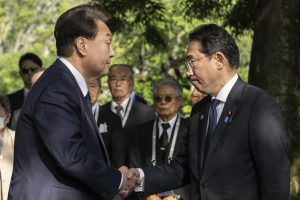Following last year’s Madrid Summit, the leaders of the four Asia-Pacific countries of Japan, South Korea, Australia, and New Zealand attended the NATO Summit in Lithuania in July. I first visited NATO Headquarters in Brussels in 1994, shortly after the end of the Cold War, a time when NATO was engaged in a heated debate about whether or not it should expand eastwards. Those days seem worlds away now that Sweden’s participation is being finalized and Ukraine’s membership is under discussion.
Speaking of change, the atmosphere between Japan and South Korea is very different from what it was just a few years ago. While at the NATO Summit, Japanese Prime Minister Kishida Fumio and South Korean President Yoon Suk-yeol held their own summit meeting. It was their fourth meeting since the start of the year.
During the past 30 years, each time I was asked about cooperative relationships in Asia, I said that I would like to see Japan and South Korea become an axis for cooperation and integration in Asia, similar to the Franco-German axis in Europe. Until quite recently that elicited only bewildered reactions in Japan., Yet as early as the 1990s, the expressions “virtual alliance” or “quasi-alliance” were being used to describe the relationship between Japan and South Korea. Now, after three decades, it feels as if a sense of direction is finally in sight.
When I apply the French-German analogy to relations between Japan and South Korea, I do so in the hope that the two democracies will provide a stable core to the region, being bound together by cultural and social mutual understanding that goes beyond mere security cooperation. Being neighbors with considerable similarities, yet still with very real differences, relations between Japan and South Korea resemble those of France and Germany in the sense that they evoke a love-hate relationship that differs from relations between countries that are more remote from one another. This is why a treaty on basic relations that goes beyond mere security cooperation – something like the Franco-German Elysée Treaty – would be appropriate for relations between the two East Asian neighbors.
As it happens, this year is the 60th anniversary of the Élysée Treaty (Franco-German Treaty of Friendship). On January 22, 60 years to the day since West German Chancellor Konrad Adenauer and French President Charles de Gaulle signed the treaty, French and German politicians gathered at Sorbonne University for a lavish commemoration. Now acknowledged as having laid the foundation for cordial relations between Germany and France in the postwar period, the treaty is a comprehensive document that aims to institutionally bind together Franco-German policies in the fields of diplomacy, defense, education, and youth.
The treaty provides that the heads of state and government of the two countries should meet at least twice a year. The Franco-German relationship in its entirety is overseen at the foreign ministerial level with ministers meeting at least once every three months to harmonize policies on key diplomatic issues to the extent possible. The relevant officials at the ministries of foreign affairs meet every month to discuss policies for political, economic, and cultural issues. The defense ministers meet at least once every three months to reconcile strategies and tactics, and to endeavor to arrive at shared concepts whenever possible. It is also stated that that personnel exchanges should be strengthened between the armed forces of the two countries, accompanied by efforts to coordinate equipment, budget and civil defense. The chiefs of staff (or their deputies) are also to meet once every two months.
Another characteristic is that officials with responsibility for educational and youth policies are required to meet every two months. Special emphasis is placed on studying each other’s language. German students are encouraged to learn French and vice-versa. There are also provisions about promoting youth exchanges and aligning compatibility between each other’s school and academic systems to promote educational and scientific exchange.
At the time of the signing of the treaty in 1963, although 18 years had already passed after the end of World War II, Franco-German relations were given a new footing thanks to the two political giants, Adenauer and de Gaulle. Today, the Élysée Treaty is a landmark in Franco-German relations, but the treaty was hardly inaugurated in a honeymoon atmosphere. At the time, France and Germany were feeling considerable uncertainty about the reliability of the U.S. commitment to continental Europe, amid signs of a détente between the United States and the Soviet Union, as well as indications of the emergence of a special “nuclear alliance” between the U.S. and Britain. The core of the Anglo-Saxon “nuclear alliance” was the British acquisition of strategic nuclear submarines equipped with Polaris missiles. West German Chancellor Adenauer held doubts about the sustainability of the U.S. commitment, and felt that he could far better rely on France, which already had a nuclear weapons development program.
Putting relations with neighboring countries on a solid footing in an uncertain world, going beyond mere diplomatic and security cooperation to stronger cultural and social ties, and empowering future generations to better understand each other – these are fundamentals that also apply to relations between South Korea and Japan today.

































